 Petzlover
Petzlover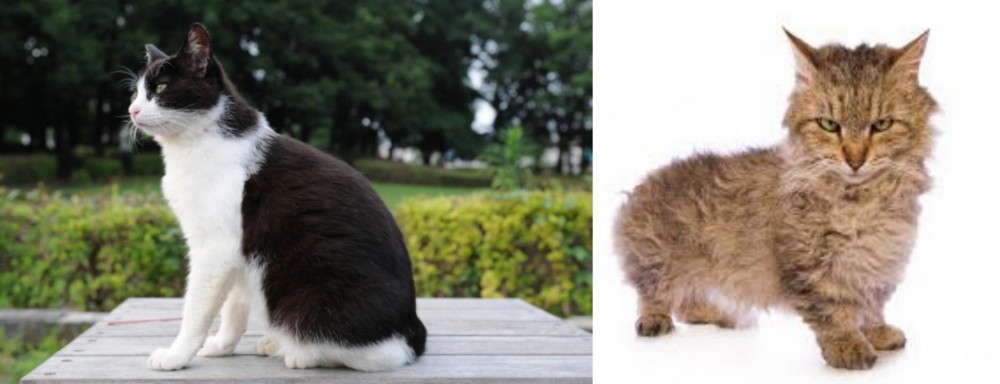 Both Bicolor and Skookum are originated from United States. Both Bicolor and Skookum are having almost same weight. Bicolor may live 3 years more than Skookum. Both Bicolor and Skookum has almost same litter size. Bicolor requires Moderate Maintenance. But Skookum requires Low Maintenance
Both Bicolor and Skookum are originated from United States. Both Bicolor and Skookum are having almost same weight. Bicolor may live 3 years more than Skookum. Both Bicolor and Skookum has almost same litter size. Bicolor requires Moderate Maintenance. But Skookum requires Low Maintenance
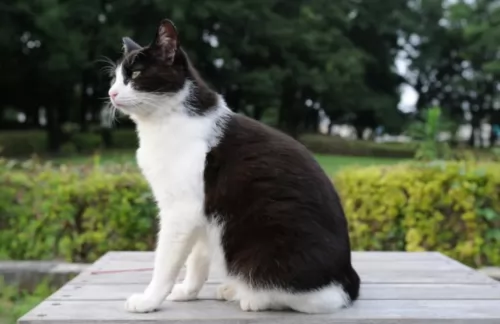 The first thing to know is that a Bicolor cat isn’t in fact a breed. Bicolor is just a term that describes a certain look that a cat has with its coat. It’s a cat with two colors such as red and white or black and white.
The first thing to know is that a Bicolor cat isn’t in fact a breed. Bicolor is just a term that describes a certain look that a cat has with its coat. It’s a cat with two colors such as red and white or black and white.
A popular name for bi-color cats is also Piebald or Tuxedo, and in fact many cat breeds can produce bicolor kittens, or black and white kittens such as Cornish Rex, Maine Coon, Manx, and others.
There are different coat color combinations when it comes to bicolor cats and the black and white markings may be more common but there are other color combinations too such as orange and white.
Nobody seems to know the origins of the Bicolor cats so we are going to assume they come from the USA.
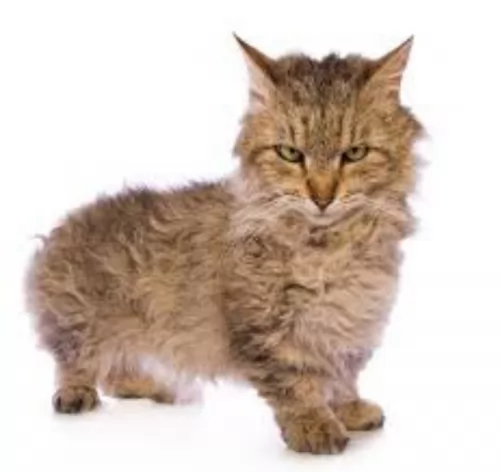 Skookums are a new cat breed – an experimental and rare hybrid dwarf cat breed, It was developed in the United States in the 1990s.
Skookums are a new cat breed – an experimental and rare hybrid dwarf cat breed, It was developed in the United States in the 1990s.
As a new breed, you’re not going to find too much information on their history, but is was breeder Roy Galusha who started crossing the Munchkin cat with the LaPerm.
Even today, some years later, the Skookum cat is still an experimental cat breed that is considered a rare dwarf breed. It is recognized as an Experimental breed by Independent European Registries as well as the Dwarf Cat Association.
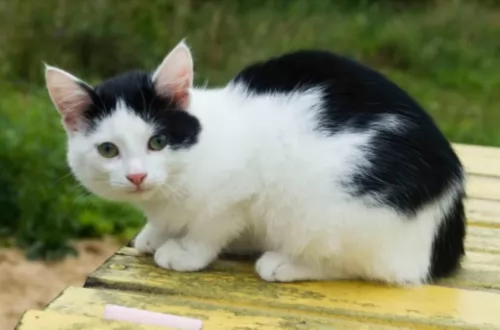 Regardless of the breed they belong to, information on these cats suggests that they can have many different looks. Look at the amazing Turkish Van cat for instance – each of these cats is recognizable for its long, luxurious fur. You’ll find a few touches of color on the cat's ears and tail, making in a Bicolor. They also have an interesting characteristic – being fond of water!
Regardless of the breed they belong to, information on these cats suggests that they can have many different looks. Look at the amazing Turkish Van cat for instance – each of these cats is recognizable for its long, luxurious fur. You’ll find a few touches of color on the cat's ears and tail, making in a Bicolor. They also have an interesting characteristic – being fond of water!
These Bicolor cats weigh in the region of 3 – 7kg, and can tend towards the smaller or larger size. Some of them can have short or long hair, larger or smaller ears and green or yellow eyes.
Coming from different cat breeds, the bicolor cat can have a mix of wonderful characteristics – they can be vocal or quiet or confident or shy.
They’re always wonderful though and can be curious, intelligent, playful, loving and loyal. They make great companions who just love the interaction they have with their human owners.
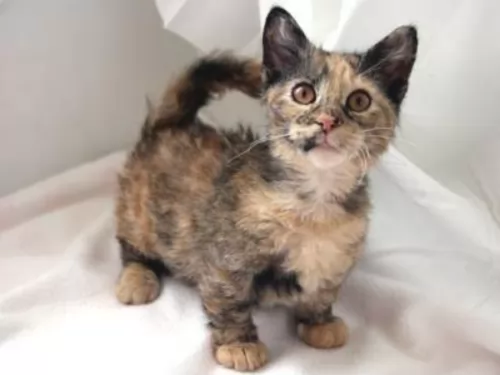 The dwarf Skookum only weighs between 2 and 3kg. It is a new cat breed with a curly coat. The coat can be in a range of colors and patterns.
The dwarf Skookum only weighs between 2 and 3kg. It is a new cat breed with a curly coat. The coat can be in a range of colors and patterns.
It is a small, lightweight cat with short legs and a broad head and stocky build. It has a muscular build. The eyes are large and walnut- shaped while the ears are large and pointed.
The neck is also thickish. The coat is soft and curly, standing away from the body and spiraling into ringlets. It can feature a number of colors and patterns such as solid, bicolor, and colorpoint. These cats can be long-haired or short-haired.
They are playful cats, full of energy and they love climbing and jumping. They’re intelligent, confident cats and are also loyal and loving towards their human family. They may be active, playful cats, but they still like to settle down into your lap.
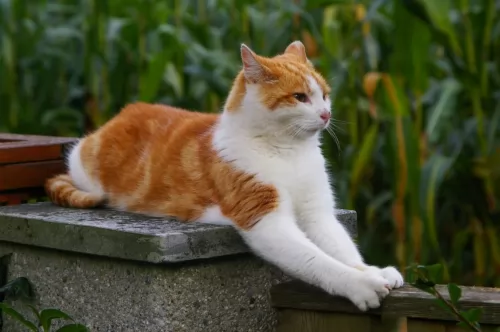 The Bicolor cat is such a steady, reliable cat-friend to have. When you start looking as these cats as your companion, you're going to get a smart, funny, adoring, playful family member who will be there for you whether you go to work each day or stay at home.
The Bicolor cat is such a steady, reliable cat-friend to have. When you start looking as these cats as your companion, you're going to get a smart, funny, adoring, playful family member who will be there for you whether you go to work each day or stay at home.
They’re such easygoing cats, with no airs and graces. They’re happy, relaxed, and uncomplicated cats and when you make a Bicolor your pet and friend, your life just becomes that much more meaningful.
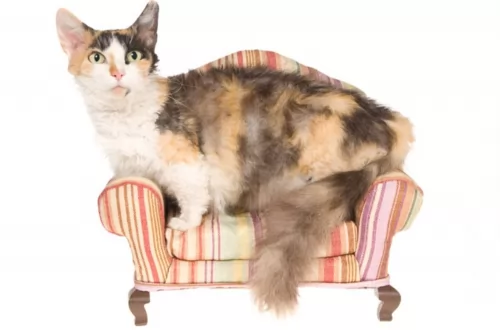 Because the Skookum cat is still in its early stages of development if you want to know precisely what the characteristics of the cat are you would want to look at the Munchkin and the LaPerm cat.
Because the Skookum cat is still in its early stages of development if you want to know precisely what the characteristics of the cat are you would want to look at the Munchkin and the LaPerm cat.
One thing is sure the Skookum cat thrives on the attention of his human family and if you provide him with the love and attention he craves, you can be sure that he will turn out to be the right friend and companion for your family.
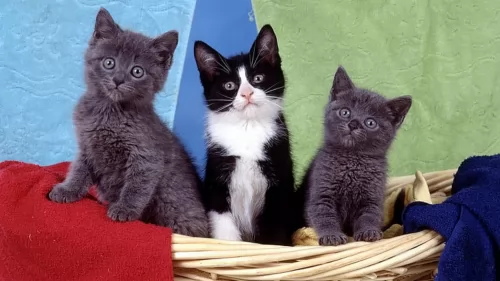 By providing your kitty cat with a loving home, you can ensure that he stays as healthy as possible. Unfortunately though, cats can get sick, regardless of how well you take care of them and then as a responsible pet owner, you will be able to take your pet to your local vet.
By providing your kitty cat with a loving home, you can ensure that he stays as healthy as possible. Unfortunately though, cats can get sick, regardless of how well you take care of them and then as a responsible pet owner, you will be able to take your pet to your local vet.
Some of the common cat problems you get can be kidney disease, ear infections, dental disease, parasites such as heartworm, cancer or something like feline immunodeficiency virus.
Whether your cat has a virus or an infection, remember that getting your cat to the vet can mean nipping the problem in the bud before it gets more serious.
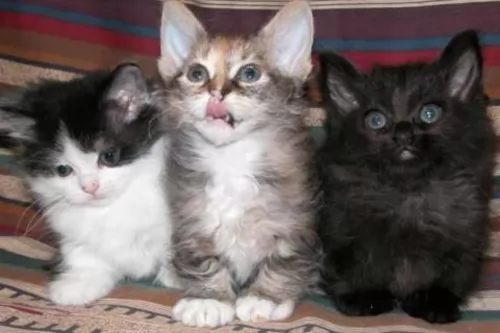 Because the Skookum cat is a new, experimental breed, health problems with the cat are not well known. However, every cat can succumb to some of the common cat health issues there are. As a pet owner you want to watch for and recognize signs that your cat’s health is in trouble.
Because the Skookum cat is a new, experimental breed, health problems with the cat are not well known. However, every cat can succumb to some of the common cat health issues there are. As a pet owner you want to watch for and recognize signs that your cat’s health is in trouble.
Feline leukemia for instance is a disease that spreads through bodily fluids such as urine, saliva and nose discharge, and saliva. Mother cats can even pass the disease along to her kittens. Feline leukemia can also lead to a host of conditions such as diarrhea, respiratory tract infections, skin problems and eye diseases among others.
Feline panleukopenia is known to most people as feline distemper and it is a very contagious viral disease with kittens being most at risk.
The disease affects a cat's immune system and the cat will likely have diarrhea, vomiting and dehydration, and lethargy. It’s a deadly disease that requires a vaccine to prevent it.
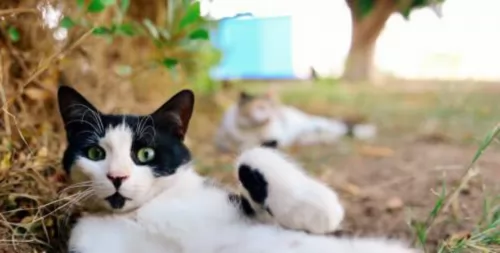 Caring for your Bicolor cat is much the same as with any other cat. Your Bicolor will shed, so brushing him will tickle him pink, especially if you do it lovingly and gently – it’s like a bonding session. The weekly brushing will get rid of loose hairs and dust and keep the coat healthy and shiny.
Caring for your Bicolor cat is much the same as with any other cat. Your Bicolor will shed, so brushing him will tickle him pink, especially if you do it lovingly and gently – it’s like a bonding session. The weekly brushing will get rid of loose hairs and dust and keep the coat healthy and shiny.
Spay or neuter your pet to avoid unwanted kittens. Stay up to date on veterinary visits and vaccinations.
Provide your cat with stimulating toys as well as all the equipment he needs to be comfortable – food and water bowls, litter box, grooming equipment, bedding, climbing- and scratching equipment.
All cat owners, whether their cats eat homemade food or wet- or dry food should read cat food labels and understand the nutrients content.
Certainly, as a carnivore, cats require certain vitamins, minerals, and proteins that only meat can provide.
Understand how to work out if the cat food is balanced or not and not packed with too many grains and carbohydrates.
How much your Bicolor eats will depend on his age and his activity levels. Be careful not to overfeed your cat as overfeeding is dangerous. When cats put on too much weight, it leads to problems such as diabetes, heart- and joint disease.
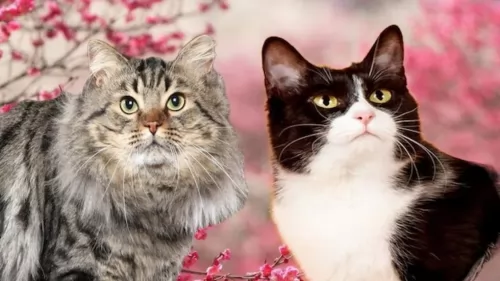 Even though the Skookum has curly hair, it’s not difficult to groom him. You want to brush the soft curls gently once a week. Keep it gentle so that you don’t make the curls frizzy.
Even though the Skookum has curly hair, it’s not difficult to groom him. You want to brush the soft curls gently once a week. Keep it gentle so that you don’t make the curls frizzy.
Use some warm water in a spray bottle with some pet conditioner and spray the curls lightly and use your fingers to liven up the curls.
Cats like to nibble throughout the day and it is better for them to feed like this as opposed to a larger meal morning and night.
However, you will need to know what your cat is eating as you don’t want to overfeed your cat. Obesity comes with a host of health issues. As a carnivore, your cat requires meaty foods so make sure to feed him high-quality cat foods that have meat and protein as the top ingredients.
Your cat must have a constant supply of fresh, cool water.
Provide your cat with a litter box. You will need to clean out the box every day of cat feces as cats don’t like to use a box that is dirty. You get special cat rakes at the vet or the pet shop that makes it easy just to rake up the feces and dispose of them.